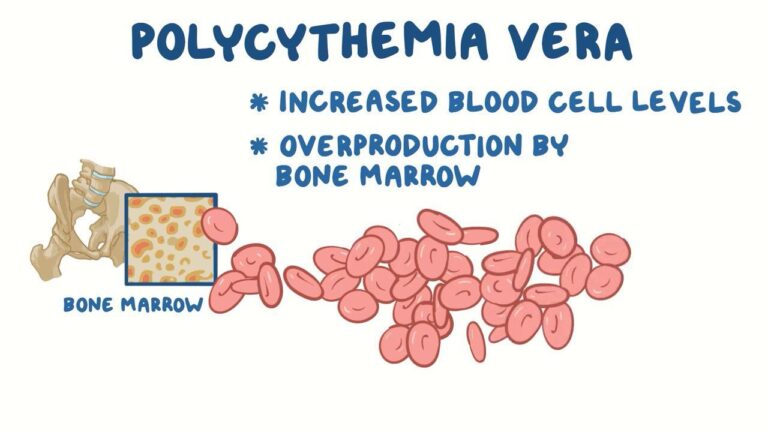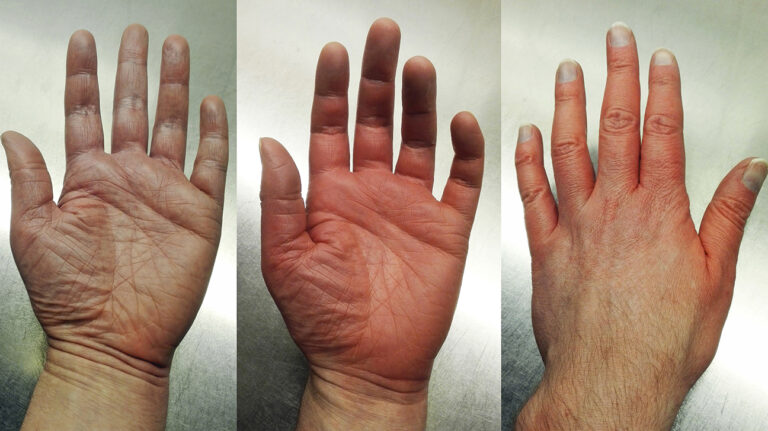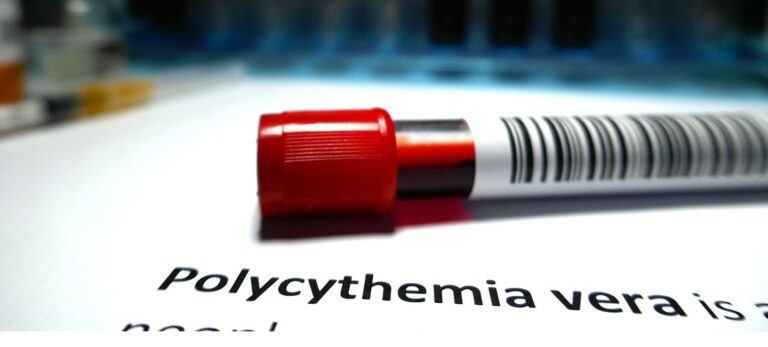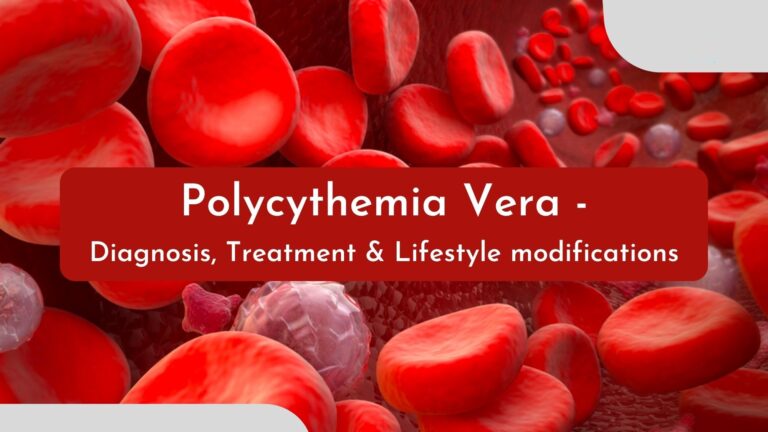POLYCYTHEMIA VERA – SYMPTOMS, CAUSES, AND TREATMENT
Polycythemia vera is a form of blood cancer. It causes your bone marrow to produce too many red blood cells. These excess cells thicken your blood, slowing its flow, which might cause severe problems, like blood clots.
Polycythemia vera is uncommon. It generally develops slowly, and you may have it for years without knowing. Often the condition is discovered during a blood test done for another reason.
Without treatment, polycythemia vera could be life-threatening. But proper medical care could help relieve signs, symptoms, and complications of this disease.
 POLYCYTHEMIA VERA SYMPTOMS
POLYCYTHEMIA VERA SYMPTOMS
Many people with polycythemia vera do not have noticeable signs or symptoms. Some people may develop vague symptoms like headache, dizziness, fatigue, and blurred vision.
More-specific symptoms of polycythemia vera include:
- Itchiness, particularly after a warm bath or shower
- Numbness, tingling, burning, or weakness in your hands, feet, arms, or legs
- A feeling of fullness soon after eating and bloating or pain in your left upper abdomen because of an enlarged spleen
- Unusual bleeding, like a nosebleed or bleeding gums
- Painful inflammation of one joint, usually the big toe
- Shortness of breath and trouble breathing when lying down

WHEN SHOULD YOU SEE A DOCTOR?
Book an appointment with your doctor if you have signs or symptoms of polycythemia vera.
POLYCYTHEMIA VERA CAUSES
Polycythemia vera happens when a mutation in a gene causes a problem with blood cell production. Generally, your body regulates the number of each of the three types of blood cells you have — red blood cells, white blood cells, and platelets. But in polycythemia vera, your bone marrow produces too many of some of these blood cells.
The cause of the gene mutation in polycythemia vera is not known, but it is generally not inherited from your parents.
POLYCYTHEMIA VERA RISK FACTORS
Polycythemia vera could happen at any age, but it is more common in adults between 50 and 75. Males are more likely to get polycythemia vera, but females tend to get the disease at younger ages.
POLYCYTHEMIA VERA COMPLICATIONS
Possible complications of polycythemia vera include:
- Blood clots – Increased blood thickness and reduced blood flow, as well as abnormalities in your platelets, increase your risk of blood clots. Blood clots could cause a stroke, a heart attack, or an obstruction in an artery in your lungs or a vein deep within a leg muscle or in the abdomen.
- Enlarged spleen – Your spleen helps your body fight infection and filter unwanted material, like old or damaged blood cells. The increased amount of blood cells caused by polycythemia vera makes your spleen work harder than normal, which causes it to enlarge.
- Problems because of high levels of red blood cells – Too many red blood cells could lead to a number of other complications, including open sores on the inside lining of your stomach, upper small intestine, or esophagus (peptic ulcers) and swelling in your joints (gout).
- Other blood disorders – In unusual cases, polycythemia vera could lead to other blood diseases, including a progressive disorder in which bone marrow is replaced with scar tissue, a condition in which stem cells do not mature or function properly, or cancer of the blood and bone marrow (acute leukemia).

POLYCYTHEMIA VERA DIAGNOSIS
Your doctor will take a detailed medical history and perform a physical examination.
Blood tests
If you have polycythemia vera, blood tests may indicate:
- More red blood cells than normal and, occasionally, an increase in platelets or white blood cells
- A higher percentage of red blood cells that make up total blood volume (hematocrit measurement)
- Increased levels of the iron-rich protein in red blood cells that carries oxygen (hemoglobin)
Bone marrow aspiration or biopsy
If your doctor suspects that you have polycythemia vera, he or she may suggest collecting a sample of your bone marrow through a bone marrow aspiration or biopsy.
A bone marrow biopsy includes taking a sample of solid bone marrow material. A bone marrow aspiration is generally performed at the same time. During an aspiration, your doctor withdraws a sample of the liquid section of your marrow.
Specific gene testing
If you have polycythemia vera, analysis of your bone marrow or blood might show the gene mutation that is related to the disease.
POLYCYTHEMIA VERA TREATMENT
There is no cure for polycythemia vera. Treatment focuses on lowering your risk of complications. These treatments might also relieve your symptoms.
Blood withdrawals
The most common treatment for polycythemia vera is having frequent blood withdrawals, using a syringe in a vein (phlebotomy). It is the same procedure used for donating blood.
This reduces your blood volume and lowers the number of excess blood cells. How often you require to have blood drawn depends upon the severity of your condition.
 Treatments to reduce itching
Treatments to reduce itching
If you have bothersome itching, your doctor might prescribe medication, like antihistamines, or recommend ultraviolet light treatment to relieve your discomfort.
Medications that are normally used to treat depression, known as selective serotonin reuptake inhibitors (SSRIs), helped relieve itching in clinical trials. Examples of SSRIs involve paroxetine (Brisdelle, Paxil, Pexeva, others) or fluoxetine (Prozac, Sarafem, Selfemra, others).
Drugs that reduce the number of red blood cells
If phlebotomy alone does not help enough, your doctor might recommend medications that can reduce the number of red blood cells in your bloodstream. Instances include:
- Hydroxyurea (Droxia, Hydrea)
- Interferon alfa-2b (Intron A)
- Ruxolitinib (Jakafi)
- Busulfan (Busulfex, Myleran)
Heart medications
Your doctor will also probably prescribe medications to control risk factors for heart and blood vessel disease, including high blood pressure, diabetes, and abnormal cholesterol.
Your doctor might suggest that you take a low dose of aspirin to lower your risk of blood clots. Low-dose aspirin might also help lower burning pain in your feet or hands.

OUTLOOK
Cold temperatures lead to physiological stress on anyone. But, if you have heart disease this cold temperature can be dangerous or even life-threatening. Taking a few precautions can reduce your risk if you are in a cold environment. Enjoy your winter – just remember to stay safe.
If you or anyone you know is suffering from polycythemia vera, our expert providers at Specialty Care Clinics will take care of your health and help you recover.
Call us on (469) 545-9983 to book an appointment with our specialists.
